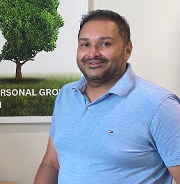Helping a teenager embrace their autistic characteristics and improve emotional regulation
- Activ8 Mind

- Aug 29, 2025
- 4 min read
POSITIVE BEHAVIOUR SUPPORT GUIDE
How did Positive Behaviour Support (PBS) help Luke*, an ambitious 15-year-old teenager, embrace his autistic characteristics, improve emotional regulation, and see that his career goals were within reach?

15-year-old Luke* is an active, friendly and ambitious teenager. He has plans to attend TAFE and he hopes to one day own his own business.
Luke had previously been diagnosed with Autism (ASD), and he was finding self-regulation challenging.
When Luke first met Robbie, our Behaviour Support Practitioner, he was presenting with physical and verbal aggression, and conflict towards his caregivers. He was also refusing to take his medication.
*Not the participant's real name - participant names have been changed to protect each individual's privacy.
How Positive Behaviour Support helped Luke improve self-regulation and enhance quality of life
To help Luke achieve his personal goals, Robbie -
Conducted a Functional Behavioural Assessment (FBA) and created an individualised behaviour support plan
Through time spent together and the completion of a Functional Behavioural Assessment (FBA), Robbie gained a strong understanding of Luke’s strengths and challenges, and the root cause of the behaviours of concern.
Robbie discovered that Luke –
Had an aversion to structured therapy approaches. This knowledge would help him determine the best way to approach and engage Luke.
Was prone to believing negative stigma around autism, and as a result –
Would try to mask his autism and shut down conversation around it.
The information that Robbie uncovered was used to create an individualised behaviour support plan, with strategies designed to address the behaviours of concern.
Provided psychoeducation on autism and coaching on self-regulation strategies
With Luke’s aversion to structured therapy approaches in mind, Robbie adopted an easy-going and casual approach. This proved conducive to Luke’s willingness to open up; the two began to build a strong, trusting relationship.
Robbie’s psychoeducation and coaching sessions focused on -
Breaking down the stigma surrounding autism
Through psychoeducation, Robbie and Luke broke down the stigma surrounding autism. Luke discovered more about autism and its features - and the strengths and challenges that he himself faced. He admitted that sensory overload could be a challenge. He also realised that he relished his ability to lock-in to different topics of interest for long periods of time.
Embracing challenging emotions and building self-regulation skills
Feelings of frustration and anger were flagged as natural and universal emotions – emotions that needed to be dealt with accordingly but not eliminated.
Robbie and Luke talked about suitable replacement behaviours for verbal and physical aggression; they brainstormed ideas to help during moments of overwhelm and anger.
Delivering psychoeducation sessions for Luke’s parent
Robbie provided tailored psychoeducation sessions for Luke’s mother. He highlighted how autism could manifest differently in individuals and discussed what this meant for her son.
During these sessions, Luke’s mother was coached on the tools that she could use to help her son during moments of dysregulation.
Did the behaviour support strategies help Luke achieve his goals?

With Robbie’s support, Luke was able to -
Eliminate instances of verbal and physical aggression and conflict with caregivers
Through psychoeducation, coaching and consistent effort, Luke saw a remarkable difference in how he approached dysregulation. He delighted in telling Robbie how, in situations where his frustration might once have manifested physically, he was now able to “take the high road” instead.
Over the months, Luke proudly told Robbie about the moments where he would take a 5-minute time out when he felt compelled to scream or yell.
Robbie and Luke explored the benefits of this new approach, and Luke noted how de-escalation could help make stressful situations feel a lot less intense.
Improve his confidence in stressful situations by embracing his strengths and challenges
Through psychoeducation, open discussions, and ongoing support, Luke was better able to understand himself and his autistic characteristics. He was able to look beyond the negative stigma surrounding autism and embrace his personal strengths and challenges.
With this, Luke became confident navigating his autistic characteristics in more stressful contexts – for example, in work or school environments.
Apply for a job... and accept a job offer!
With his newfound confidence, and his self-regulation skills, Luke felt ready to apply for a job and begin working on a TAFE application.
Not long after the commencement of the service, he had accepted – and started working – at a Butcher’s shop.
Support for individuals living with autism and finding self-acceptance and emotional regulation challenging.
Our team of behaviour support practitioners work with individuals living with autism and experiencing behaviours of concern. Services are provided in Adelaide, Ballarat, North Melbourne, North West Melbourne, West Melbourne, and North East Melbourne.
We’re here to support NDIS participants seeking:
Request our support via the online NDIS referral form or by contacting our friendly team at 1300 575 329 / info@activ8group.com.au.
Please note –
This real-life example is not intended as advice for self-treatment. Limited information has been provided, and the reasons behind an individual’s behaviours of concern may differ, even if they appear similar to those outlined within this article. If you or a loved one are living with autism and experiencing behaviours of concern, please seek individualised support from a trained professional.
Meet our Melbourne and Ballarat-based PBS Practitioners
Robbie, the PBS Practitioner who shared insights for this Positive Behaviour Support Guide, has now left Activ8 Mind to travel the world and continue his studies.
Our Melbourne and Ballarat-based PBS practitioners are available to provide support for children (7+), adolescents, and adults living with a disability and experiencing behaviours of concern. Meet Sam (Melbourne), Coby (Melbourne West), and Sid (Ballarat).















Comments